Stephen Roney's Blog, page 270
December 19, 2019
Some Quite Interesting Christmas Entertainment
'Od's Blog: Catholic and Clear Grit comments on the passing parade.
Published on December 19, 2019 06:34
December 18, 2019
We Who Must Die Demand a Miracle
Alone, alone, about a dreadful wood
Of conscious evil runs a lost mankind,
Dreading to find its Father lest it find
The Goodness it has dreaded is not good:
Alone, alone, about our dreadful wood.
Where is that Law for which we broke our own,
Where now that Justice for which Flesh resigned
Her hereditary right to passion, Mind
His will to absolute power? Gone. Gone.
Where is that Law for which we broke our own?
The Pilgrim Way has led to the Abyss.
Was it to meet such grinning evidence
We left our richly odoured ignorance?
Was the triumphant answer to be this?
The Pilgrim Way has led to the Abyss.
We who must die demand a miracle.- W.H. Auden, "Advent," from Christmas Oratorio
How could the Eternal do a temporal act,
The Infinite become a finite fact?
Nothing can save us that is possible:
We who must die demand a miracle.
'Od's Blog: Catholic and Clear Grit comments on the passing parade.
Published on December 18, 2019 09:07
Deck the Halls
For Advent:
'Od's Blog: Catholic and Clear Grit comments on the passing parade.
Published on December 18, 2019 08:57
Sale on Playing the Indian Card
Don't miss it! From December 25 to January 1, my book Playing the Indian Card is available in ebook format for half the usual price at Smashwords. Only $2.50!
https://www.smashwords.com/books/view/787100
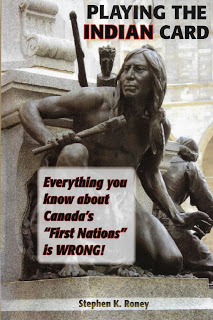
'Od's Blog: Catholic and Clear Grit comments on the passing parade.
Published on December 18, 2019 07:50
Why Poetry Is So Bad
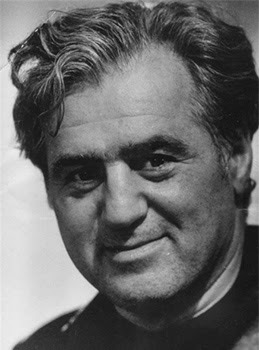 A man who should need no introduction.We were discussing the other night, I and a prominent local poet, the sad fact that no one is interested in poetry any more.
A man who should need no introduction.We were discussing the other night, I and a prominent local poet, the sad fact that no one is interested in poetry any more.“Even other writers,” she laments, “never come out for poetry readings.”
I remarked on the dramatic change from my youth, when perhaps a dozen poets were national celebrities, and everyone had read at least one of their poems. Irving Layton, Earle Birney, Margaret Atwood, Al Purdy, Dennis Lee, Milton Acorn, Leonard Cohen, F. R. Scott, P.K. Page, George Bowering, bpNichol ….
And we both immediately agreed on the problem: it is that poets in Canada now write only to impress one another, and not for the general public. It had become, in proper Canadian style, a Family Compact.
It seemed to me the solution was simple: launch our own poetry journal, to bypass all this and get directly to the public. We could have a podcast, a YouTube channel.
No, she explained, she did not have time for that. Too much editing required.
I did not see the problem—just a matter of selecting the poems to feature, right?
Ah, she explained, but we would need to find experienced poets with a strong publication record to evaluate each entry.
I could not make her see the irony of her position. This is exactly what we were trying to get away from.
“But,” a colleague intervened, “who else is qualified to evaluate a poem? Would you let non-doctors evaluate a medical treatment?”
Here, I think, we see the essential problem. Not just with poetry, not just with art in general, but with our current society. The very problem that is getting some folks out in the streets wearing yellow vests, and others voting Johnson or Trump.
It is the forming of little cartels everywhere, seizing control of everything. Generally under the banner of “professionalism.” While it does make some limited sense for doctors or engineers, it does not for most other endeavours. It is a disaster for poets, or any artists, or journalists, or teachers. Can you imagine the rule applied to comedians? Only other comedians get to decide what is funny?
Even for doctors or lawyers, it is a dangerous seizure of power by a self-selected group, with little oversight; and, in effect, a cartel in restraint of trade.
Prior to this, and driving it, is an obsession among the educated with the concept of power. This is why politics has permeated everything: they think life itself is all about grabbing power and money for themselves and their group.
And the obsession with power probably comes, in turn, from a collapse of morality. Take ethics out of the picture, and what is left? Grabbing as much as possible for yourself.
But power and politics is especially a blasphemy against art.
'Od's Blog: Catholic and Clear Grit comments on the passing parade.
Published on December 18, 2019 07:17
Words on Water
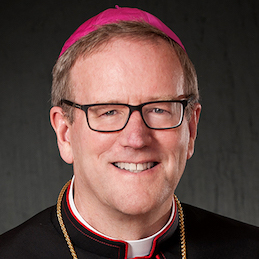 Bishop Robert Barron
Bishop Robert BarronI am a bit put off by the name Bishop Barron has chosen for his online organization, “Word on Fire.”
It just does not fit.
Bishop Barron is a pretty upbeat guy, who thinks everyone may go to heaven, we are destined to become gods, and those trying to evangelize should stress beauty and avoid morality.
I don’t see any fire.
It feels like a Catholicism of words alone.
It’s the kind of “I’m OK, you’re OK,” “gentle Jesus meek and mild,” Hallmark, plaster saints, everything-is-ducky-as-it-is, don’t-rock-any-boats kind of Catholicism that really turns me off.
If this is all Catholicism is, why do we need Catholicism?
And where in this is there room for someone who was innocently tortured and then crucified for speaking truth?
I wouldn't mind so much--perhaps Bishop Barron is doing good for some constituency--if it were not for co-opting the term "Word on Fire." That seems sinister. That implies there is nothing more than this. Nothing that actually tests us, like gold tested in fire. Or that might make us repent in ashes. Or that sees things ripe for burning, like Sodom and Gomorrah.
Happy happy joy joy.
'Od's Blog: Catholic and Clear Grit comments on the passing parade.
Published on December 18, 2019 06:39
December 17, 2019
Words and Deeds
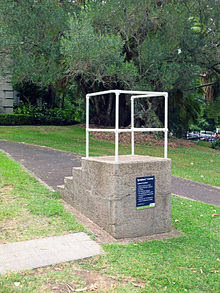 Speakers' Corner, Hyde Park, London
Speakers' Corner, Hyde Park, LondonIn our discussion last night, my friend Cyrus defended “hate speech” laws. I argued that the only speech that can legitimately be regulated is speech with clear material consequences, on the familiar principle that “my right to swing my fist ends where your nose begins.” Accordingly, slander, libel, fraud, yelling “fire” in crowded theatres, or incitement to violence should be outlawed—but no more.
Because, among other reasons, any speech that makes a point worth making is guaranteed to upset someone. No free speech, no meaningful discussion, no democracy, no human progress.
He countered that it was in practice difficult to distinguish speech inciting violence from speech that simply expressed an opinion. He offered the examples “blacks do not deserve to live” and “kill all the blacks.” Can we really clearly distinguish the former from the latter?
I do not see any difficulty here.
We have always made this same distinction in common law. It would be fairly unremarkable for someone to say, “Jack Poulson does not deserve to live.” A bit shocking, because it is a severe condemnation, but fairly acceptable in polite company. After all, we have a common phrase, “Jack Poulson is a waste of oxygen.” Same meaning.
But to tell someone to kill Jack Poulson we understand as incitement to action; if the listener follows through, the speaker is, like Charles Manson, guilty of murder.
A dramatic distinction, that we have always understood. No different for groups.
I could name people who I would say do not deserve to live. People whose net contribution has been to make the world a worse instead of a better place. That does not mean I would either murder them, or condone murdering them. Just as, if I said someone did not deserve their wealth, it would not be an endorsement of robbing them.
'Od's Blog: Catholic and Clear Grit comments on the passing parade.
Published on December 17, 2019 12:02
Practical or Transcendent Morality
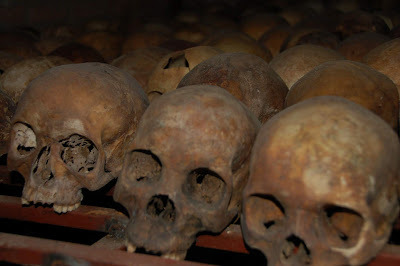 Relics of the Rwandan genocide.My good buddy Cyrus rejects my contention that there are transcendent values: most famously, the Good, the True, and the Beautiful.
Relics of the Rwandan genocide.My good buddy Cyrus rejects my contention that there are transcendent values: most famously, the Good, the True, and the Beautiful. In conversation last night he insisted that morality could be derived entirely from the pragmatic needs of society. “Do unto others” simply ends up being in our mutual interest. So it is all empirical.
I disagree. It might be entirely to a society’s—that is, a group’s—benefit to allow or encourage murder of some distinct target group. Then the murderers, after all, might get all their stuff. This works fine so long as the designated group is relatively powerless, and distinct enough that no members of the dominant group fear the same force being turned on them in future.
Whenever some society has considered itself free from traditional moral constraints, this is exactly what has happened, and happened soon: mass murder of some vulnerable and distinct “other” group. The Jews or the disabled in Nazi Germany, the kulaks or Ukrainians in Soviet Russia, the unborn today.
Murder is the most dramatic example, but by the same principle, a society that does not accept transcendent values can equally justify any other sort of wrong against the vulnerable group: lying, theft, enslavement, and so forth.
So the practical needs of society cannot produce morality.
'Od's Blog: Catholic and Clear Grit comments on the passing parade.
Published on December 17, 2019 11:31
The Journey of the Magi
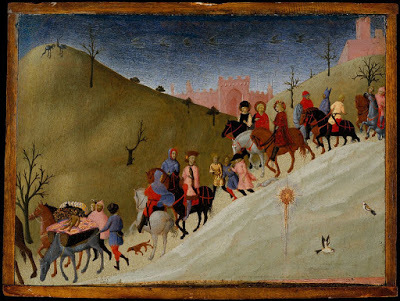
A cold coming we had of it,
Just the worst time of the year
For a journey, and such a long journey:
The ways deep and the weather sharp,
The very dead of winter.’
And the camels galled, sorefooted, refractory,
Lying down in the melting snow.
There were times we regretted
The summer palaces on slopes, the terraces,
And the silken girls bringing sherbet.
Then the camel men cursing and grumbling
and running away, and wanting their liquor and women,
And the night-fires going out, and the lack of shelters,
And the cities hostile and the towns unfriendly
And the villages dirty and charging high prices:
A hard time we had of it.
At the end we preferred to travel all night,
Sleeping in snatches,
With the voices singing in our ears, saying
That this was all folly.
Then at dawn we came down to a temperate valley,
Wet, below the snow line, smelling of vegetation;
With a running stream and a water-mill beating the darkness,
And three trees on the low sky,
And an old white horse galloped away in the meadow.
Then we came to a tavern with vine-leaves over the lintel,
Six hands at an open door dicing for pieces of silver,
And feet kicking the empty wine-skins.
But there was no information, and so we continued
And arriving at evening, not a moment too soon
Finding the place; it was (you might say) satisfactory.
All this was a long time ago, I remember,--T.S. Eliot
And I would do it again, but set down
This set down
This: were we led all that way for
Birth or Death? There was a Birth, certainly
We had evidence and no doubt. I had seen birth and death,
But had thought they were different; this Birth was
Hard and bitter agony for us, like Death, our death.
We returned to our places, these Kingdoms,
But no longer at ease here, in the old dispensation,
With an alien people clutching their gods.
I should be glad of another death.
'Od's Blog: Catholic and Clear Grit comments on the passing parade.
Published on December 17, 2019 08:53
Fairy Tale of New York
For Advent:
'Od's Blog: Catholic and Clear Grit comments on the passing parade.
Published on December 17, 2019 08:42



